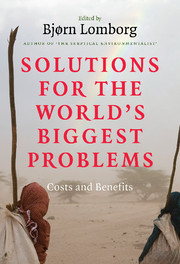Book contents
- Frontmatter
- Contents
- List of figures
- List of tables
- List of contributors
- Acknowledgements
- Introduction
- Part I Economy
- Part II Environment
- Part III Governance
- 11 Arms proliferation
- 12 Conflicts
- 13 Corruption
- 14 Lack of education
- 15 Terrorism
- Part IV Health and population
- Conclusion: Making your own prioritization
11 - Arms proliferation
Published online by Cambridge University Press: 08 July 2009
- Frontmatter
- Contents
- List of figures
- List of tables
- List of contributors
- Acknowledgements
- Introduction
- Part I Economy
- Part II Environment
- Part III Governance
- 11 Arms proliferation
- 12 Conflicts
- 13 Corruption
- 14 Lack of education
- 15 Terrorism
- Part IV Health and population
- Conclusion: Making your own prioritization
Summary
The problem
To proliferate normally means to increase rapidly in number or quantity, or to grow or reproduce by rapid production of new parts (biological). When used in the case of arms, proliferation has tended to relate to nuclear weapons, where it means the spread of production technology to nations that do not already have it. More recently concerns have been raised about the spread of other dangerous technologies (chemical and biological) and of weapons themselves. For large weapons systems it can be the spread of production technology, but increasingly it is simply the spread of weapons per se. In this case we can distinguish qualitative and quantitative proliferation, the former being the increase in the number of agents that have more advanced weaponry (or technology) than is generally available through receiving it from another country, for example missiles or missile technologies, the latter being the increase in the numbers of weapons available, such as the increase in the number of small arms being supplied to countries (often cascading to groups other than the military). This means that proliferation is not simply the supply of arms per se. If we start from a particular status quo (balance) it would mean an increase in the spread of more advanced arms or arms technology across countries, or a marked growth in the quantity of arms available.
- Type
- Chapter
- Information
- Solutions for the World's Biggest ProblemsCosts and Benefits, pp. 199 - 219Publisher: Cambridge University PressPrint publication year: 2007

